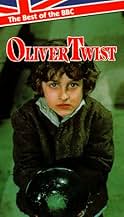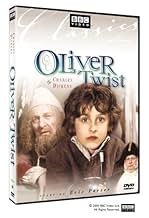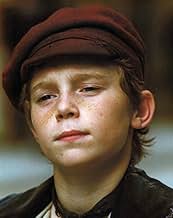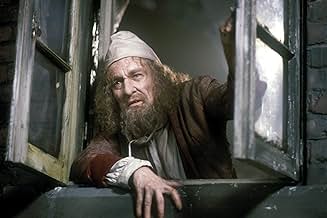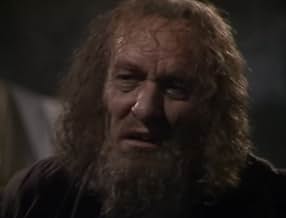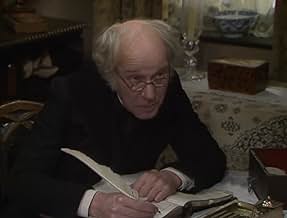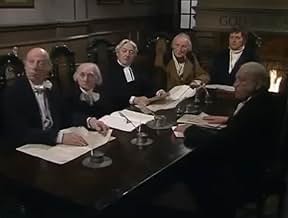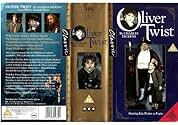Aggiungi una trama nella tua linguaAn orphan named Oliver Twist meets a pickpocket on the streets of London. From there, he joins a household of boys who are trained to steal for their master.An orphan named Oliver Twist meets a pickpocket on the streets of London. From there, he joins a household of boys who are trained to steal for their master.An orphan named Oliver Twist meets a pickpocket on the streets of London. From there, he joins a household of boys who are trained to steal for their master.
- Premi
- 1 candidatura in totale
Sfoglia gli episodi
Recensioni in evidenza
It is not easy televising Dickens. His novels are so vivid you have a picture of the characters in your mind. This series uses its 12 29 minute parts to make the images its own and enhance them. I could get carried away with superlatives so let's look at the negatives which really centre on the Maylie household. This takes up the best part of 2 or 3 episodes and is pretty dull. The first couple of episodes are difficult but that is part of the acclimatisation process noted above. Now onto the superlatives.
The BBC has done an amazing job in conjuring up both the riches of the middle classes but more importantly the desperate poverty on the streets. The state of Fagin's quarters and Sykes' disgusting one room hovel are hard to contemplate. The state of the Thames is reminiscent of Dickens' telling.
The acting is top class. Too many to mention but Eric Porter as sly, devious, charming and mercenary Fagin is one, Michael Attwell brings menace to Bill Sykes. Pip Donaghy triumphs as Monks. Godfrey James as bully boy Mr Bumble and Miriam Margoyles as his soon to be domineering wife. The list goes on. So refreshing to see a case of actors building on substantial roles.
The story is modified: Betsy disappears altogether and Monks takes on a starring role. The last few parts are riveting as the net closes. I could go on. TV does not get much better
The BBC has done an amazing job in conjuring up both the riches of the middle classes but more importantly the desperate poverty on the streets. The state of Fagin's quarters and Sykes' disgusting one room hovel are hard to contemplate. The state of the Thames is reminiscent of Dickens' telling.
The acting is top class. Too many to mention but Eric Porter as sly, devious, charming and mercenary Fagin is one, Michael Attwell brings menace to Bill Sykes. Pip Donaghy triumphs as Monks. Godfrey James as bully boy Mr Bumble and Miriam Margoyles as his soon to be domineering wife. The list goes on. So refreshing to see a case of actors building on substantial roles.
The story is modified: Betsy disappears altogether and Monks takes on a starring role. The last few parts are riveting as the net closes. I could go on. TV does not get much better
This version keeps a lot more of the novel than most, but most of this material lacking in other versions covers the Maylie sub-plot, which is mawkish and conventional Victoriana.
Many reviewers have commented that the series does not stint on the squalor of Hanoverian London (the action takes place in pre-Victorian times). I actually disagree and feel that it sanitizes things. Reviewers write of the "cramped" rooms when I thought they were were more spacious than many a million pound flat in today's London.
The direction, camera-work and score were plodding TV quality only, and the actors in some parts unsubtle. Bill Sykes looked the part, and for once you could see why Nancy might have been attracted to him, but his acting skills were one-dimensional. I liked Eric Porter's Fagin. It was based on the Guinness version, but without the anti-semitic element which is embarrassing in the earlier movie.
Too many of the children's roles suggested middle-class kids from drama school.
I give the makers credit for faithfulness and not attempting smart-ass interpolations or anachronistic social comment, and maybe enjoyment would be enhanced by watching in the original 12 half-hour episodes, but viewing it purely as a "movie" it is fairly dull, especially compared to David Lean's masterpiece. Sharper editing would help to speed things along.
Many reviewers have commented that the series does not stint on the squalor of Hanoverian London (the action takes place in pre-Victorian times). I actually disagree and feel that it sanitizes things. Reviewers write of the "cramped" rooms when I thought they were were more spacious than many a million pound flat in today's London.
The direction, camera-work and score were plodding TV quality only, and the actors in some parts unsubtle. Bill Sykes looked the part, and for once you could see why Nancy might have been attracted to him, but his acting skills were one-dimensional. I liked Eric Porter's Fagin. It was based on the Guinness version, but without the anti-semitic element which is embarrassing in the earlier movie.
Too many of the children's roles suggested middle-class kids from drama school.
I give the makers credit for faithfulness and not attempting smart-ass interpolations or anachronistic social comment, and maybe enjoyment would be enhanced by watching in the original 12 half-hour episodes, but viewing it purely as a "movie" it is fairly dull, especially compared to David Lean's masterpiece. Sharper editing would help to speed things along.
I thought that this was an exceptional production, particularly because it starred a young Scott Funnell. At such a young age, his performance was nothing less than remarkable, evoking emotions on a primeval level. I cannot speak more highly of this young superstar, except to say that he has a bright future ahead, matched only by his aspirations and delusions of grandeur. The supporting cast put in an admirable performance too, despite the show stopping form displayed by the Funnell. It was something i wish i did in my youth. Watch this because you will soon find that nothing can match it for sheer pluck and tenacity.
The BBC really know how to 'do' Dickens.
From Dudley Simpson's haunting title music to Eric Porter's sinister Fagin, this is truest adaptation of the book that I know.
The production values are spot-on, capturing the filth and seediness of Dickens' London. Michael Attwell is the most menacing of Bill Sykes and Ben Rodska makes Oliver innocent without being too goody-goody.
If that were not enough, the length of the production (6 hours) means that, for once, the sub-plots are included and the main plots are laid out as Dickens wrote them.
If 6 hours is too long then David Lean still represents the safest bet but, for the purist, this will probably never be improved upon.
From Dudley Simpson's haunting title music to Eric Porter's sinister Fagin, this is truest adaptation of the book that I know.
The production values are spot-on, capturing the filth and seediness of Dickens' London. Michael Attwell is the most menacing of Bill Sykes and Ben Rodska makes Oliver innocent without being too goody-goody.
If that were not enough, the length of the production (6 hours) means that, for once, the sub-plots are included and the main plots are laid out as Dickens wrote them.
If 6 hours is too long then David Lean still represents the safest bet but, for the purist, this will probably never be improved upon.
I have seen virtually all of the version of Oliver Twist. This one is difficult to come by now in the UK, I had to buy a dutch DVD and use an old DVD player. However, I was not disappointed as this is by far the most complete and definitive version of Oliver Twist. This version adheres very closely to the novel. Usually in Oliver adaptations you have the workhouse stuff at the beginning, then as soon as Oliver gets to London it is virtually then a story about Fagin and Bill Sykes and it uses the gritty romance of these characters to carry the rest of the story home. But it is not a story of Fagin, it is called Oliver Twist. And more specifically, Oliver Twist, the Parish Boy's Progress. This version really keeps Oliver and his challenges and progress through his young life as central to the story. We learn in full depth about his scheming relative Monks and all of his family relations as they come to learn about each other, stuff that is sometimes left out entirely but which is absolutely essential for the story to make sense. Fagin was just as cruel a human being as Bill Sykes and spends the entire novel trying to exploit him for his own ends. Often this is lost in Oliver adaptations which romanticise the life of the thieves as if they were dodgy but well-meaning members of the underclass.
But it is not simply because it the most faithful that this version is in my opinion the definitive. The production and casting is just perfect too. There is no greater Bill Sykes than Michael Atwell (sorry oliver reed), Amanda Harris is fantastic as Nancy, and Eric Porter does a great Fagin too. Ben Rodska is perhaps not as easily lovable as Mark Lester but he is very sweet and does a great job.
This to my mind is the only version of Oliver worth watching now. Oliver! 1968 will have a fond place in many peoples hearts, and has great music and the perfect Mr Bumble (Harry Secombe). But at the end of the day it is not truly Oliver Twist. Alec Guinness perhaps does the perfect Fagin in David Lean's 1948 version. But make sure you see this for the complete Oliver experience. The story and characters will make so much more sense to you.
But it is not simply because it the most faithful that this version is in my opinion the definitive. The production and casting is just perfect too. There is no greater Bill Sykes than Michael Atwell (sorry oliver reed), Amanda Harris is fantastic as Nancy, and Eric Porter does a great Fagin too. Ben Rodska is perhaps not as easily lovable as Mark Lester but he is very sweet and does a great job.
This to my mind is the only version of Oliver worth watching now. Oliver! 1968 will have a fond place in many peoples hearts, and has great music and the perfect Mr Bumble (Harry Secombe). But at the end of the day it is not truly Oliver Twist. Alec Guinness perhaps does the perfect Fagin in David Lean's 1948 version. But make sure you see this for the complete Oliver experience. The story and characters will make so much more sense to you.
Lo sapevi?
- QuizOf the 30 or so filmed versions of the same Charles Dickens novel (excluding indirect adaptations and parodies such as Oliver & Company (1988)), this is considered the most complete and accurate adaptation, as it manages to depict almost all of the characters and incidents from the book.
- ConnessioniFeatured in Terrance Dicks: Fact & Fiction (2005)
I più visti
Accedi per valutare e creare un elenco di titoli salvati per ottenere consigli personalizzati
- How many seasons does Oliver Twist have?Powered by Alexa
Dettagli
- Tempo di esecuzione
- 6h(360 min)
- Colore
Contribuisci a questa pagina
Suggerisci una modifica o aggiungi i contenuti mancanti

